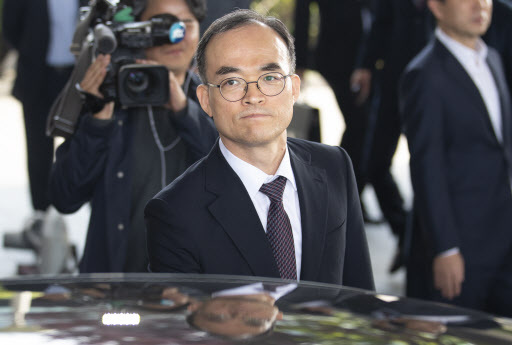[Newsmaker] Tension mounts over police-prosecution investigative rights reform
By Ock Hyun-juPublished : May 6, 2019 - 15:43
Tension is rising over plans to redistribute investigative rights between the prosecution and police in South Korea, in the wake of a public denunciation from the country’s top prosecutor.

Last week, Prosecutor-General Moon Moo-il publicly criticized the recent parliamentary decision to approve the fast-tracking of reform bills, backed by the ruling Democratic Party and three minor opposition parties, saying the bills would undermine democratic principles mandating a system of checks and balances.
The four parties placed the bills -- which deal with the revamping of investigative rights -- on the fast track in late April despite strong protests from the main opposition Liberty Korea Party.
Cho Kuk, presidential secretary of civil affairs, said Monday that the top prosecutor’s concerns should be heard as well. It marks the first time he has commented on the recent controversy.
“There are concerns that the police would be given too much authority because they can close cases, when the readjustment of prosecution-police investigative rights is legislated,” he said in a post on Facebook. “There are measures prosecutors can take to control it but such concerns should be clearly solved.
“The reform of institutions holding power under the Moon Jae-in administration is not carried out for the interests of specific institutions. It was designed to maintain checks and balances among the body investigating high-ranking officials, the prosecution and the police.”
Moon, who cut his four-country trip short and returned home Saturday, is expected to deliver a public message in the coming days.
“I agree that a change is needed in how the prosecution carries out its duty but in any case there should be no loophole in protecting people’s basic rights,” Moon said Saturday at Incheon Airport.
The most contentious points of the bills are the proposal to expand police autonomy, allowing the police to open and close cases without approval from the prosecution, as well as the establishment of a special investigative body tasked with independently investigating and indicting high-ranking government officials implicated in corruption.
Prosecutors have said such an arrangement could give the police excessive power, in the absence of any measures to keep them in check, and could also cause inefficiency in law enforcement. The police have dismissed such concerns.
The Moon Jae-in administration seeks to overhaul the prosecution’s investigative rights and give the police greater autonomy to conduct probes. This was one of Moon’s campaign pledges and was at the center of the president’s campaign to root out social injustice.
The prosecution in Korea has the exclusive rights to indict and seek warrants for suspects, and has broad judicial control over the police. Critics say this system fails to provide adequate checks and balances and has led to abuses of power.
The prosecution does not oppose changes to its investigative rights. But it stressed the need to adopt a reformed policing system, with some police divisions under the authority of the central government and others under the municipalities, before prosecutors’ power can be shared with the police.
Koreans appear supportive of reform moves that would limit the prosecution’s power.
According to a survey released Friday, conducted by Realmeter and CBS and involving 9,059 adults, 57.3 percent of the respondents were in favor of readjusting the balance of its investigative rights, saying it was necessary to curb the authority of the prosecution. Some 31 percent were against the move, saying the police could end up enjoying too much authority.
Justice Minister Park Sang-ki and Interior Minister Chin Young also called for the readjustment of the prosecution’s investigative rights in accordance with the principle of checks and balances last week amid an intensifying power struggle between the prosecution and the police.
The Liberty Korea Party, on the other hand, is stepping up its attack on the Moon administration.
Party Floor Leader Na Kyung-won said the top prosecutor’s “protest” in public only proves that the bills are controversial even within the government.
Though the parties have put the bills on the fast track, it could take up to 330 days for discussions in the parliament to conclude. After that, they need to be submitted for a vote at the regular session of the National Assembly.
(laeticia.ock@heraldcorp.com)
-
Articles by Ock Hyun-ju





![[From the Scene] Monks, Buddhists hail return of remains of Buddhas](http://res.heraldm.com/phpwas/restmb_idxmake.php?idx=644&simg=/content/image/2024/04/19/20240419050617_0.jpg&u=20240419175937)





![[Graphic News] French bulldog most popular breed in US, Maltese most popular in Korea](http://res.heraldm.com/phpwas/restmb_idxmake.php?idx=644&simg=/content/image/2024/04/18/20240418050864_0.gif&u=)



![[From the Scene] Monks, Buddhists hail return of remains of Buddhas](http://res.heraldm.com/phpwas/restmb_idxmake.php?idx=652&simg=/content/image/2024/04/19/20240419050617_0.jpg&u=20240419175937)

![[KH Explains] Hyundai's full hybrid edge to pay off amid slow transition to pure EVs](http://res.heraldm.com/phpwas/restmb_idxmake.php?idx=652&simg=/content/image/2024/04/18/20240418050645_0.jpg&u=20240419100350)

![[Today’s K-pop] Illit drops debut single remix](http://res.heraldm.com/phpwas/restmb_idxmake.php?idx=642&simg=/content/image/2024/04/19/20240419050612_0.jpg&u=)